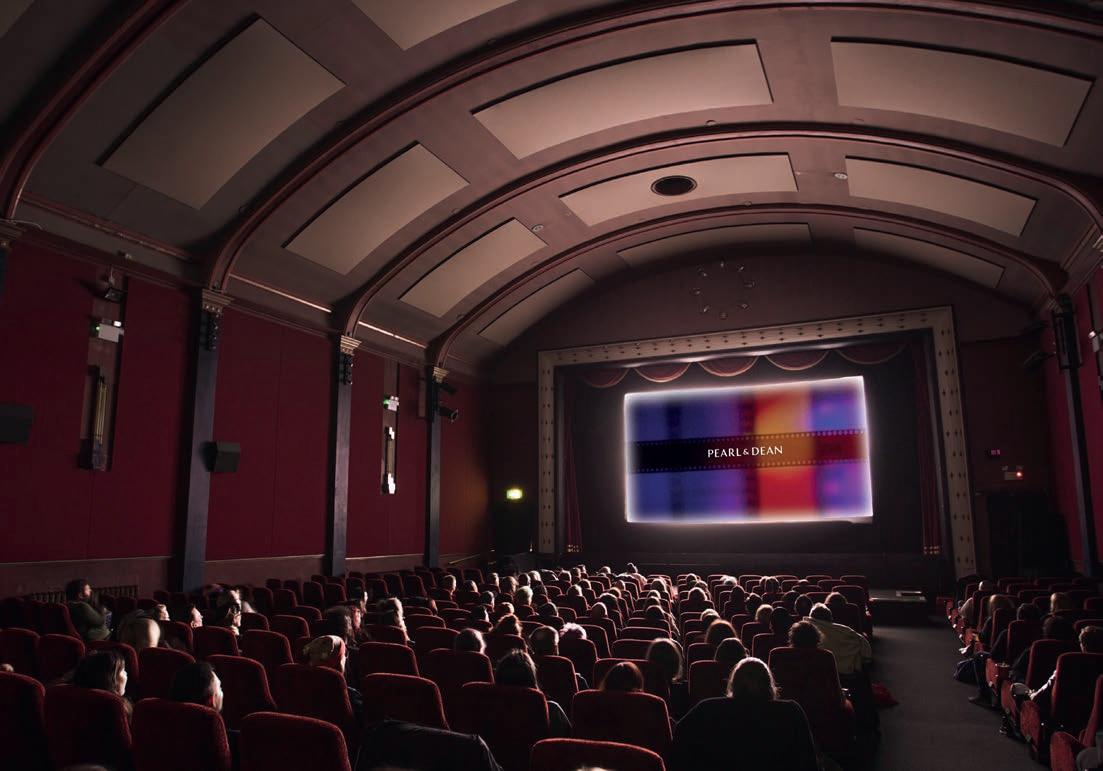
13 minute read
As CEO of Pearl & Dean, Kathryn Jacob heads one
An industry that’s accessible to all

As CEO of Pearl & Dean, Kathryn Jacob heads one of cinema’s most iconic names, the perfect position from which to champion diversity in cinema.
Words: Melissa Cogavin
KATHRYN JACOB’S accomplishments are considerable and impressive; hugely intelligent, modest with a wicked sense of humour, her insight, positive outlook “We have a company mantra which is “to harness our passion for film, to build great brands between films and audiences and the films they appear in.” It’s all about open relationships with the people that we work with,” she told me. and vision have seen her embrace her “Mark Williams at WTW cinemas in Cornwall — we are both 15-year tenure as CEO of the cinema massive cricket fans. I’ll text him during a test match saying: advertising Pearl & Dean — only a fraction of the work she also ‘Are you watching this, I feel sick. OMG what’s happening now, handles outside office hours on subjects including the effects every time I walk in the room we lose a wicket!’ You can only of advertising on body image and mental health. have that kind of culture in a sector where people welcome it.
Kathryn’s energy and positivity are infectious, and she has It might not thrive in a place as open and people oriented as nothing but good things to say about Pearl & Dean, where she cinema is. If we were a firm of actuaries, I don’t think the has been CEO for 15 years. The company was founded in 1953 culture would be quite the same,” she added. and is embedded in the UK’s collective cinema consciousness for its iconic theme tune, “Asteroid”, (though perhaps better The end of the world as we know it...? known to all as the ‘pa-pa, pa-pa, pa-pa, pa-pa, pa-pa-pa’ While 2020 will linger in all our memories for not very good theme). The company has endured substantial market reasons, Kathryn is undaunted by gloomy predictions. “We are changes and recently added Everyman to its impressive client at a funny point now. Recent events have thrown into contrast list. Despite stiff competition and ups the difficulties that some people face. I and downs, 67 years on and it occupies 20% of the UK market screen advertising “Pearl & Dean is a think we have an awareness as a society that we have got to change things and if business and is in good shape. What is supportive, creative we are going to be in a global fight for her fondest memory of her time at Pearl business with great talent and to maximise our success as & Dean, I wondered? people… I was only businesses, we have to not treat our staff “My fondest time – oh God, all the time. It’s been the best job I’ve ever had. I work with the best people, talented, meant to be there for six months!” as commodities. The majority of people really want to do well in their jobs and have fulfilling careers. It’s interesting super hard working, I laugh every time now — a few years back nobody would at least five times a day. It’s a supportive, creative, ambitious have let people work flexibly — Covid has taught us we can. business with really nice people. I was only meant to be there People are in fact more productive. You don’t need to work in for six months. Lovely Mike Hope-Milne — he said he was only office hours necessarily. Actually, there are fewer distractions going to stay 18 months and he’s still there. It’s the best place and output is probably higher; it’s a rigorous and more focused to work. There is a relentless amount of affectionate mickeyway of working. It’s about having faith in your staff,” she taking, so much mutual respect and support.” I suggested that explained. The zero-hours contract, supremely stiff this sort of culture only happens if the executive team creates competition, increasing unemployment and the gig economy it in the first place, then it trickles down, but Kathryn batted have probably also focused people’s minds on earning money that idea away with typical modesty. while they have the opportunity.
Fact File
Kathryn Jacob, CEO, Pearl & Dean
Kathryn Jacob is CEO of Pearl & Dean and sits on the Advertising Association Council. She is ex-President of Women in Advertising and Communications .
Pa-pa pa-pa… generations of cinemagoers know Pearl & Dean
True to Kathryn’s character is the fact that she sees the future of our sector in terms of focus on people rather than on commercial imperatives. What about the calamitous cinema landscape? Again, Kathryn is unfazed. “We’ve been hearing about the demise of cinema since radio was invented,” she
sighed. “We’ve seen off threats from TV, VHS, DVD, piracy, streaming and now we have Covid. Everyone is talking about the release of “Tenet” — sure it means changing release patterns. Maybe it will be a huge success, maybe it will mean business as usual. It’s certainly business for now.” Maybe it will change things for the better, she added.
Given the plethora of SVOD platforms, she argues, why do people still go to the cinema? For the same reason it is impossible to get tickets to Glastonbury — for the experience. “There is nothing better than sitting in a cinema, viewing a film as a crowd,” she says, “We are pack animals; we want an emotional experience. I went back to the cinema for the first time last week and there was a genuine sense of ‘everyone else in the room’ — ooh, here we are, aren’t we great!”
“We love finding points of contact with other people.


Cinema’s future is safe,” Kathryn assured me, “There is nothing to worry about. It’s all about investing in the content, not the platform.” She’s right of course. The consumer is interested in seeing “Mulan” — they have no particular loyalty to the studio that made it; there is no special thrill to be gained in choosing the bespoke platform offering it at $29.99 + subscription fee. While some take to social media to bemoan the changing landscape, Pearl & Dean has spent the summer successfully working on pop-up cinemas and drive-ins with its partners Luna Cinema and Rooftop Cinema. Kathryn accepts the current landscape is challenging but is relentlessly upbeat about the opportunities for people out there and feels certain the UK cinema industry will weather this storm.
A champion for equality
Kathryn is the co-author of two books now, the second of these, “Belonging: The Key to Transforming and Maintaining Diversity, Inclusion and Equality at Work” (Bloomsbury Publishing) is due for publication at the end of October. It addresses diversity in the workplace, how to make it happen and how we all stand to benefit. Critically and commercially well received, her first book “The Glass Wall” offers ‘a strategy
Kathryn Jacob’s two books focus on diversity and equality, subjects that have defined her career

for success to help women capitalise on opportunities at work, or overcome the inevitable complications that will arise over the course of a career’.
Kathryn’s positive tone is all over her first book, a marked difference from some of the strident, aggressively feminist writing elsewhere characterised by an unfortunate tendency to alienate. The designer Diane von Furstenberg (among other luminaries) agrees: “It is so important to empower other women and that is exactly what this book does. It gives women practical advice to help them navigate careers and, ultimately, design their own life.”
An award-winning contributor
Like a lot of us, Kathryn left university without much idea about what might come next. “Oh no I didn’t have any idea. University, then let’s see. No regrets! God no. I’ve had an absolutely brilliant career, I love my job and I love the people I work with.” Kathryn was the first girl in her family to go to university and afterwards took a role at a regional newspaper as a graduate trainee. This led to positions at “The Daily Telegraph”, IPC Magazines and Virgin Radio, which evolved into Ginger Media Group, where she became commercial director, before joining Pearl & Dean
Cinema has the ability to change and challenge attitudes in a way that television cannot, says Kathryn Jacob
as CEO. In addition to her day job she sits on the Development Board of Women’s Aid, the Advertising Association Council and the Government’s Expert Group on Body Confidence, for which she was awarded an OBE in 2010. How did that come about? Kathryn gives a hoot of laughter. “The OBE was the result of another string! In 2010 I joined a Government Expert Group led by [former Liberal Democrat leader] Jo Swinson.” She expanded on this, explaining the damaging effect that airbrushed images in advertising have on young people and their mental health.
“There was talk of kitemarks on advertisements at the time to say they haven’t been touched up. Editorial is always touched up though; look at old Hollywood photos, everything is retouched — everyone knows it. The idea that the public is so stupid that they think if they use this face powder that they will look like the models in the ads is just mental.
“I did some work on the views of girls and mothers on the advertising in a report called ‘Pretty as a Picture’ representation of women in advertising.” In 2011, 84% of girls polled were well aware that airbrushing is a part of advertising, that they were less trusting of brands using airbrushing and opinions skewed toward more natural-looking images shown to them over
airbrushed, perfect models. In 2020, it is likely young people are now even more savvy, which is comforting.
Kathryn warmed to this theme. Representation of women in the media is high on her agenda, and there is work to be done. “One Indian woman I talked to told me the only representations of Indian women in the media are variously as a doctor, a pharmacist, or standing next to an elephant. We have so much work to do on this.” Though Kathryn has done some with the Home Office and Equalities Office, the same applies across all groups. “It’s the same with body dysmorphia in boys,” she went on, agreeing that the impact of social media and the value placed on rippling muscles and buff midriffs is damaging and unrealistic for all but a few in the real world.
Breaking down barriers
Her book “The Glass Wall” was published in 2016, the culmination of her research and co-written with her good friend Sue Unerman. “I have known Sue for so long I can’t remember meeting her. She came to see me and said ‘I want to write a book about women in careers but I won’t do it unless you write it with me. It was a brave decision on her part, as prior to that we had only exchanged texts and emails really. I am an extrovert, she is an introvert; we are very different and have very different backgrounds.” She went on to add this duality of perspectives was a strength and added weight to the arguments presented in the book.
“The aim of the book wasn’t to say ‘men are all bad, step aside’, Kathryn was keen to stress. Indeed, “The Glass Wall” is dedicated to “all the strong women in our lives, especially our daughters, and the lovely men that support them and us.” She explains: “It was about a system and a culture that exists — a toxic, alpha male atmosphere, which doesn’t work for all sorts of men and women. A lot of men don’t want to play that game and they find it really hard to negotiate.”
I pressed Kathryn on this. “There are unspoken rules in the workplace. It’s like trying to explain the offside rule; if you don’t understand it it’s impossible to play football. That’s hard if you’re a man and if you’re a woman it’s harder still. Understanding the rules of the game — arming yourself — was one of the reasons why we wrote the book. We heard women and men saying ‘It’s me, it’s my fault for not understanding the game. When we did talks afterwards, the number of men that told us how much that resonated with them was amazing.”
She added, “People told me ‘This book has changed my career; it’s made me realise I can get the career that I want.’ It was the most gratifying bit about it.” What is the next book about? “That really came out of all the talks we did with the
The golden rule? Do unto others...
I had a good idea what advice Kathryn would offer to those looking to get into the film business — and it brings us back to her core philosophy. “Work hard. Be fair to people. Treat people the way you want to be treated and learn from them. Nepotism and who you know in this industry is still rife. I’ve done ‘Speakers for Schools’ sessions at all-girls schools and I had one smart Indian girl who wanted to work in film, but her parents were adamant it wasn’t a real career. “Be a production accountant instead,” I told her. No one realises there are loads of other really amazing skilled jobs out there — there is an education gap there. We need to make it more accessible for new talent; we all stand to benefit. Diversity is important and our own industry certainly promotes it enough on the screen. Look at the way in which film can treat subjects. Cinema gives you permission in a way that TV can’t because it’s going direct into people’s homes. Cinema has changed attitudes, it’s dealing with big, difficult subjects. Look at the taboos broken by films such as “The Crying Game” in the 90s, by “Brokeback Mountain” in the 00s.”
first one. We did about 200 talks to blue-chip banks, women’s groups, places like the London School of Economics — and what we realised was that people that aren’t in an identified group (such as BAME, LGBTQ etc); most of them want to create dynamic and diverse organisations. And I’m not talking about tokenism; that doesn’t last. The blurb is inspiring. “Belonging is the call to action we need today — the tool to turn the men in power into allies as we battle discrimination, harassment, pay gaps, and structural racism and patriarchy at every level of the workplace. The lessons in this book will help us work together to build a better workplace where everyone feels they belong.”
The talent that should be ours
Few have the breadth of understanding that Kathryn has, and the million-dollar question was on my mind. “What does the future hold?” She felt it was all tied to valuing each other and understanding that value. All across the supply chain? “Absolutely. Client supplier, exhibitor, distributor. Understanding the dynamics of the business.”
These are sentiments which are echoed in her books; clearly Kathryn sees value in the talent this industry attracts, and is passionate about developing, nurturing and sustaining that talent so we all succeed. Wordcount stops me, but Kathryn is a force of nature and I could have talked to her all day. With her vision, hopefully we will one day make our industry as accessible as it deserves to be for all.
ALWAYS A GOOD FIT

The Best of Both Worlds
LTI has harnessed the power and brightness of Laser Technology. LTI is the only manufacturer that can supply both laser upgrade Helios laser systems give you all the advantages of laser projection systems and xenon lamps. You choose the best technology for without the cost of a new laser projector. Our low cost, long life your application: high performance, long life laser for your larger systems can be integrated into all digital cinema projectors. It’s so screens, cost-effective xenon lamps for smaller screens. LTI’s flexible you can switch from xenon lamp to laser and back again. The revolutionary Helios modular laser upgrade systems fit multiple advantages of an LTI laser system are clear, constant and affordable. projectors and can be easily relocated between projectors as your requirements change.
www.ltilighting.com








